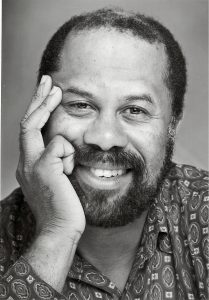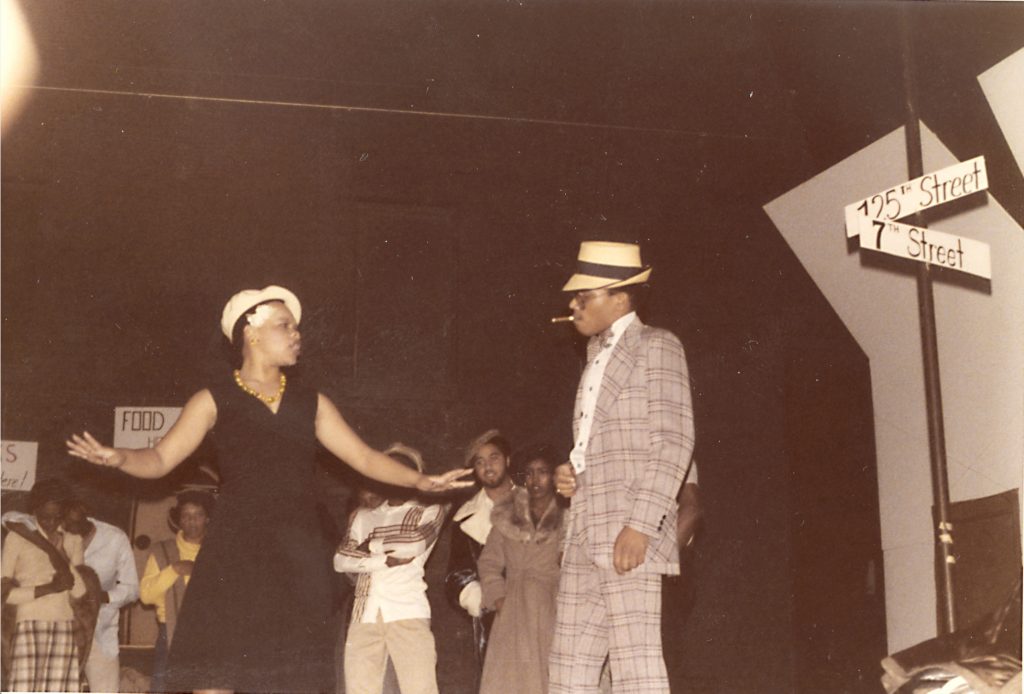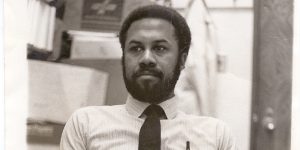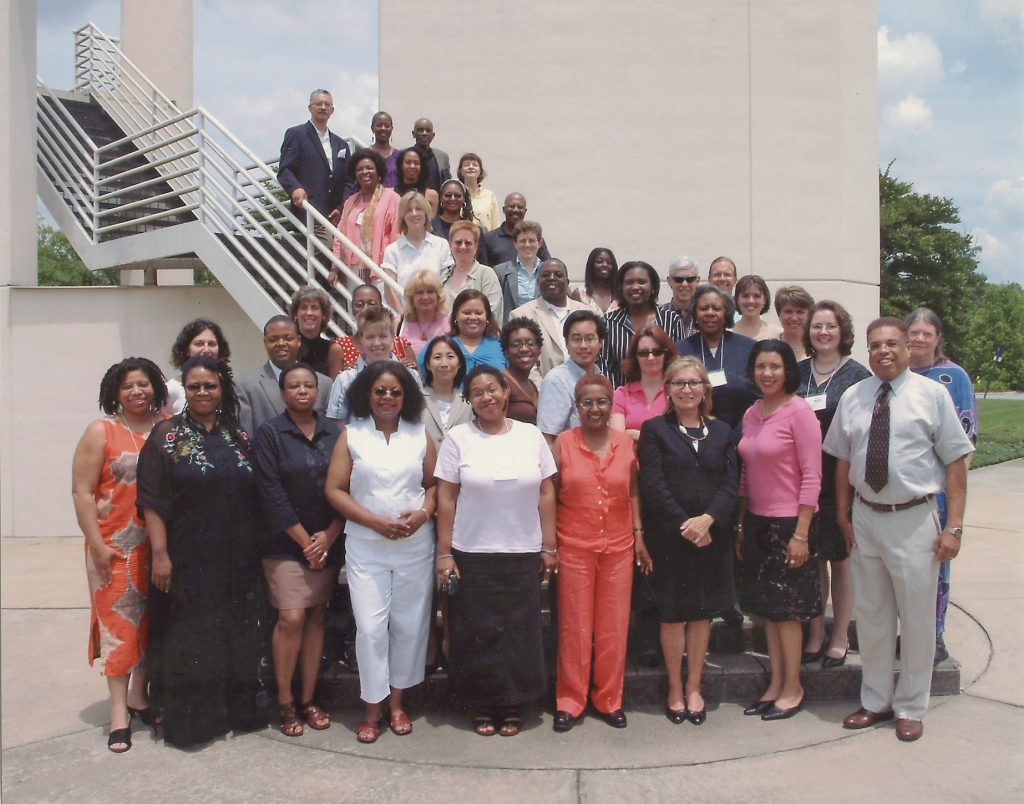Written by: Garland Reiman, Digital Communications Intern
Dr. Johnny Lee Greene, distinguished Professor of African-American Literature and a pioneer of campus diversity at UNC, is the subject of a recently published collection entitled “Gathering Memories: The Life and Legacy of Dr. J. Lee Greene.” His recent passing prompted this collection of memories in which former students, colleagues and faculty members share an insightful look at the man behind the name, with memories ranging from class lectures and office hour meetings to causal conversations and academic conferences. The collection demonstrates how his work impacted not only the people he met over the years, but the very structure of the University of North Carolina at Chapel Hill. Editors Keith Clark, Leslie Frost and Adam McKible assembled these tributes into the printed collection, which expands on these memories in wonderful detail, currently available in the Main Office of Greenlaw Hall.
 A beloved fixture of Greenlaw Hall, Dr. Greene represented not only a revolutionary figure in the field of literature, but also created a genuinely safe space for students to express themselves and their personal difficulties as they adapted to academic life. As an alumnus of the University’s English Department, Dr. Greene returned to campus in the 1970s to teach courses in African-American Literature. At the time, classes in African-American Literature were breaking new ground in university curricula around the country, and Dr. Greene was a pioneer in establishing this emerging field. In 1977, he published his first scholarly monograph entitled Time’s Unfading Garden: Anne Spencer’s Life and Poetry, a piece that offers a rare look into the private life of Harlem Renaissance poet Anne Spencer, who previously had declined to have anything written about her at all. His determination and passion present in his fieldwork with Spencer translated to the classroom as well. Former students at UNC consistently recall that Dr. Greene had a unique capacity for pushing students out of their comfort zone and challenging them with fresh perspectives and innovative interpretations.
A beloved fixture of Greenlaw Hall, Dr. Greene represented not only a revolutionary figure in the field of literature, but also created a genuinely safe space for students to express themselves and their personal difficulties as they adapted to academic life. As an alumnus of the University’s English Department, Dr. Greene returned to campus in the 1970s to teach courses in African-American Literature. At the time, classes in African-American Literature were breaking new ground in university curricula around the country, and Dr. Greene was a pioneer in establishing this emerging field. In 1977, he published his first scholarly monograph entitled Time’s Unfading Garden: Anne Spencer’s Life and Poetry, a piece that offers a rare look into the private life of Harlem Renaissance poet Anne Spencer, who previously had declined to have anything written about her at all. His determination and passion present in his fieldwork with Spencer translated to the classroom as well. Former students at UNC consistently recall that Dr. Greene had a unique capacity for pushing students out of their comfort zone and challenging them with fresh perspectives and innovative interpretations.
Former student Christopher Alan Bracey, class of 1992, confirms his penchant for pushing the envelope, noting that one of the most remarkable qualities of Dr. Greene was “his uncanny ability to make you a more thoughtful, fearless, and complete person than you ever believed possible.” Rosalind Fuse-Hall, class of 1980, reveals similar sentiments in her own tribute to the late Dr. Greene. His “demanding assignments stretched my thinking,” she admits, “but when he offered that mirthful grin, a stroke of his beard and comment, ‘I think you’re getting there’, I was more than satisfied.”
At UNC, Dr. Greene had a reputation for winning every award he was nominated for—in 1977, he received the Amoco Foundation, Inc. Award for Excellence in the Inspirational Teaching of Undergraduate Students; in 1987, he was awarded the Tanner Award for Excellence in Undergraduate Teaching; from 1991-1994, he was established as a Bowman and Gordon Gray Professor and in 1995, was awarded the James M. Johnston Award. After receiving these awards, in 1996, Dr. Greene published a study of African American novels entitled Blacks in Eden: The African American Novel’s First Century. His last work, The Diasporan Self: Unbreaking the Circle in Western Black Novels, was published in 2008.
Behind Dr. Greene’s academic achievements was a genuine, caring professor who was invested in his students on every level. Fondly referred to as “the Sage”, Dr. Greene represented the type of professor who struck the balance between erudite scholar and friendly adviser, the one who could carry on intense intellectual conversation while simultaneously giving practical life advice to students figuring out their life path. Former student Toi Carter, class of 1980, is quick to remark on how, as a professor, he “encouraged us to discover the richness of the stories, the craft, the words, the symbolism, and the pride that comes from understanding our connection to great works. He poured himself into each one of us and let us know we mattered.”
 For Dr. Greene, the passion he had for African-American Literature was amplified by his passion for his students and their reactions to the works they engaged with both in and outside of the classroom. Dr. Greene’s production of the play Down Home: Depicting Life from Our African Past to Our American Present, drew students from every department within UNC and fostered an incredible sense of community on campus. The play, however, was not without controversy; the staging of an interracial student production in the face of an uncooperative drama department was unheard of and to stage the play itself in Memorial Hall was even more so. Regardless of its unconventional nature, former students and faculty recall the play as an exceptional experience which represented a cultural milestone on campus that was sold out and celebrated for decades.
For Dr. Greene, the passion he had for African-American Literature was amplified by his passion for his students and their reactions to the works they engaged with both in and outside of the classroom. Dr. Greene’s production of the play Down Home: Depicting Life from Our African Past to Our American Present, drew students from every department within UNC and fostered an incredible sense of community on campus. The play, however, was not without controversy; the staging of an interracial student production in the face of an uncooperative drama department was unheard of and to stage the play itself in Memorial Hall was even more so. Regardless of its unconventional nature, former students and faculty recall the play as an exceptional experience which represented a cultural milestone on campus that was sold out and celebrated for decades.
At a meeting known as the “Gathering,” hosted in 2006, a myriad of Dr. Greene’s past students convened to share the work they’ve accomplished in their academic careers since completing his undergraduate mentorship. Among doctorate degrees and published pieces, each students praised Dr. Greene for the impact he had on their life and career. Dr. Robert Cannon, who was instrumental in organizing the “Gathering,” recalls how the conference affected Dr. Greene himself. “The ‘Gathering’ provided an opportunity for Johnny Lee to realize the culmination of his effort to shine a light on the work that he and his fellow colleagues had done in producing some of the next generation of talented African-American literature scholars,” Dr. Cannon writes in his own tribute regarding the experience, “I was elated that the conference was a success and disappointed that we had not started years earlier.” For Dr. Greene, education very much existed outside of the classroom, and this philosophy was clearly taken by heart his students who went on to produce diverse bodies of work in their respective fields following his instruction.
The same year as the “Gathering” in 2006, Dr. Greene officially retired from UNC. Even in his retirement, he continued his passion for African-American literature by using recently discovered photos of schools his grandfather built to serve as the basis of the African-American Heritage Museum of Rutherford County, located in Forest City, North Carolina, which opened its doors in 2012. On Saturday, October 28th, 2017, he lost a more than ten-year battle with cancer. Although Dr. Greene will be deeply missed, his legacy at the University of North Carolina at Chapel Hill as a champion of African American literature, diversity, and student involvement on campus will forever remain.



